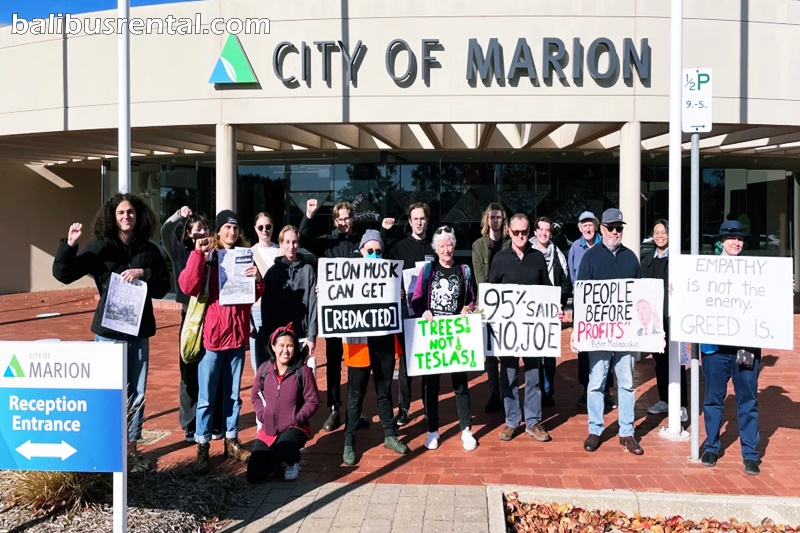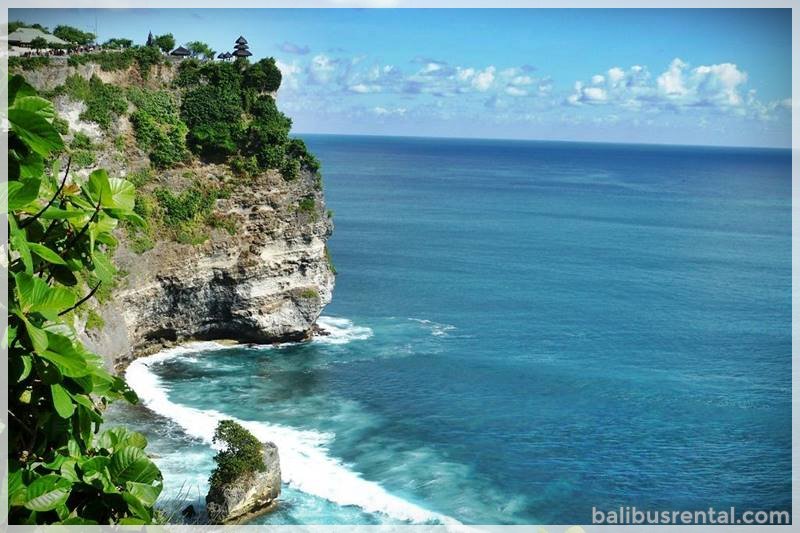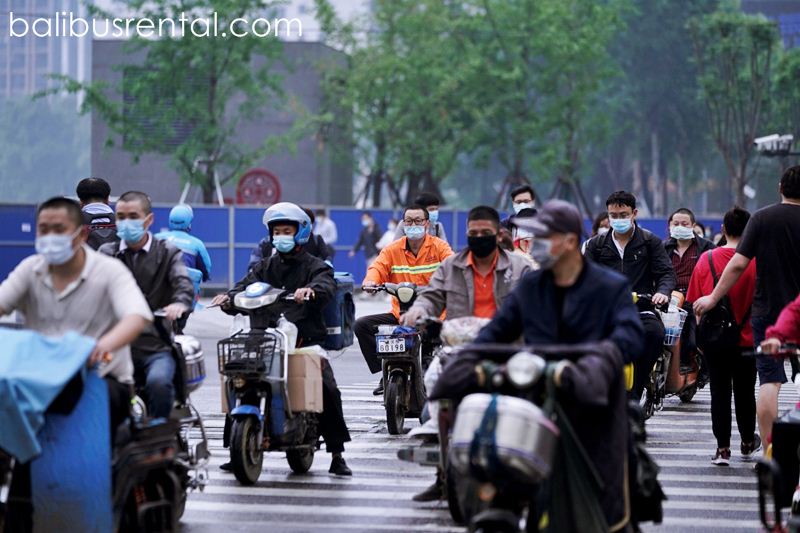Friday | June 6, 2025
Brisbane, Australia — When friends Neon and Zane launched a campaign to oppose Tesla’s plan to build a battery recycling factory on a small parcel of land in their neighborhood, they believed that public opinions about the company’s controversial billionaire CEO might influence local sentiment.
What they didn’t anticipate was just how deeply anti-Elon Musk sentiment had taken root—not only in the United States, where Musk recently stirred controversy as the former head of the Department of Government Efficiency, but far beyond, including their own backyard in Australia.
Neon and Zane—who chose to use pseudonyms to avoid harassment from Musk’s supporters—started their campaign, Trees Not Teslas, with the goal of protecting approximately 60 trees on the site in Tonsley, a suburb south of Adelaide, the capital of Australia’s driest state.
“We’re already short on designated green space,” said Neon, who previously lived near the area and still works nearby. “It’s insulting to try and take away one of the last patches left in Tonsley.”
When the local Marion Council released the results of its community consultation on the development proposal—which would enable the land to be sold for redevelopment—it was flooded with hostile comments. Many focused not just on environmental concerns but on Musk himself. The report included hundreds of incendiary remarks, with 229 references to “Nazi,” “Nazism,” and similar language, revealing the intense backlash.
Musk, known for his high profile and polarizing presence on social media, has become a global lightning rod—particularly for those opposing former U.S. President Donald Trump’s policies. His ongoing, public feud with Trump is playing out across rival social media platforms, drawing global attention.
Musk’s previous alignment with Trump appears to have damaged Tesla’s image. In the first quarter of this year, the company reported a 13% drop in global vehicle deliveries—the steepest decline in its history—amid growing competition and consumer backlash.
In Tonsley, public opposition to the proposed factory was fierce. One consultation comment read: “You and I both know it’s getting torched every few months because of the Nazi implications. You really want that brought up at every meeting?”
Several submissions referenced a gesture Musk made at Trump’s post-inauguration rally in January, which critics likened to a fascist salute. Musk later dismissed the criticism, posting on X: “The ‘everyone is Hitler’ attack is sooo tired.”
Nevertheless, the incident clearly left an impression. An overwhelming 95% of the more than 900 public submissions rejected the plan to prepare the site for sale. Despite this, the Marion Council approved the measure and forwarded it to the state government for final approval.
Save the trees
It may seem surprising that residents of a small Australian city would take issue with Elon Musk, given the physical and political distance between them and his influence. What makes it even more unexpected is South Australia’s past positive experience with the billionaire entrepreneur.
Back in 2017, Musk made international headlines by promising to build the world’s most powerful battery in South Australia within 100 days—or do it for free. He delivered on that promise, and today the state leads the nation in renewable energy, on track to reach 100% net renewables by 2027.
With state government backing, Tesla partnered with a local energy provider to create a “virtual power plant” by installing Powerwall batteries in homes across the state. These batteries work together to stabilize the grid during times of peak demand.
But the proposed Tesla facility in Marion, a suburb of Adelaide, is not about generating energy. Instead, it would serve as a battery recycling center and a showroom for Tesla’s electric vehicles—sales of which have declined across Australia.
According to the Electric Vehicle Council, Tesla’s nationwide sales nearly halved in the year leading up to May 2025. Felipe Munoz, a senior analyst at JATO Dynamics, attributes part of that decline to delays in the arrival of the Model Y. When the model finally launched in May, Tesla’s Australian sales rebounded sharply—jumping 122% compared to the same period last year.
Still, for many residents, the issue goes beyond Tesla’s business. Marion Council Mayor Kris Hanna said that public outrage—much of it focused on Musk personally—overshadowed what was, in his view, a routine consultation on how to use contaminated land that’s been fenced off since 2016.
“This site will probably never be safe for recreational use again,” Hanna said. “The concern isn’t just kids playing in the soil—it’s the fumes. Trichloroethylene (TCE), which contaminates the site, is a carcinogenic solvent banned in the United States. Covering it with a car park or building could actually help contain the risk.”
While access to the land is restricted, locals say its mature trees provide critical habitat for birdlife in a neighborhood with very little tree cover. More importantly, according to the Conservation Council of South Australia, those trees may also be helping to prevent contaminants from leaching into groundwater.
“Removing the trees increases the risk of those pollutants spreading and potentially threatening human health,” said Kirsty Bevan, the council’s CEO. She argued that Tesla’s pledge to plant 59 saplings in place of the felled trees isn’t enough.
“We’re calling for more research and proper remediation before anything proceeds,” Bevan said. “The improvements we’re looking for would come in the form of a forest, not a factory.”
As for the public opposition campaign and its anti-Musk tone, Bevan distanced herself: “I don’t let personal opinions about people I’ve never met interfere with my role as a voice for nature.”
New plant, more jobs
Mayor Kris Hanna said that while the council heard the strong public opposition, it ultimately voted 8–3 in favor of the proposal, citing the economic benefits it would bring—including around 100 new jobs, which he described as “a huge number” for the area. He also noted that a new business would contribute to local tax revenue, helping ease financial pressure on residents during a cost-of-living crisis.
“A substantial new factory coming into the area is a big deal,” Hanna said. “It’s located next to a high-tech manufacturing precinct we developed on the site of a former car plant, so a facility recycling electric batteries actually fits in very well.”
But not all council members agreed. One of the dissenting votes came from Councillor Sarah Luscombe, who argued that the overwhelming community feedback had been ignored. Residents, she said, had made it clear they wanted more green space—not industrial development.
“The people I’ve spoken to are tired of having their voices sidelined in favor of large corporations,” Luscombe said. “More and more, communities are saying, ‘Hang on—I want to be heard, and I want my views to count.’”
Across the globe, discontent with Musk has been growing. In recent months, Tesla vehicles and showrooms in various countries have been vandalized by critics angry over Musk’s political affiliations—including his support for far-right parties in Europe—and his increasingly controversial behavior.
Following the council vote, Hanna said the local government had received a wave of “vitriolic correspondence,” but he dismissed concerns about potential violence. He declined to comment on Musk personally.
“As mayor, I don’t take a political or ideological stance,” Hanna said. “My goal is simply to make life better for the people in my community.”
In a statement, South Australian Local Government Minister Joe Szakacs said the state government would follow its usual process in determining whether the land should be approved for sale.
“Our government welcomes investment and job creation in South Australia,” Szakacs said, adding that it remains committed to achieving 100% net renewables by 2027.
Any final approval would still require the landowner to submit a development application and to remediate the site in line with state environmental standards. The Environment Protection Authority of South Australia noted that it had held early discussions with both the council and the developer. It also emphasized that cleaning up long-standing contamination is often a complex, expensive, and time-consuming process.
In response to the council’s decision, Neon and Zane organized a spontaneous rally outside the Marion Council building on Wednesday, calling on the state government to reject the rezoning plan. A small but vocal group of protesters gathered, holding signs—one of which read, “Elon Musk can get [redacted].”
Unmoved by the promise of new jobs, Neon remains steadfast in opposition to the project. “Those jobs would be on toxic land, for a company tainted by Elon Musk,” he said.
“Ninety-nine of the 117 pages in the consultation report were negative,” he added. “If you ignore that, you’re not representing the people—you’re selling out to business.”




